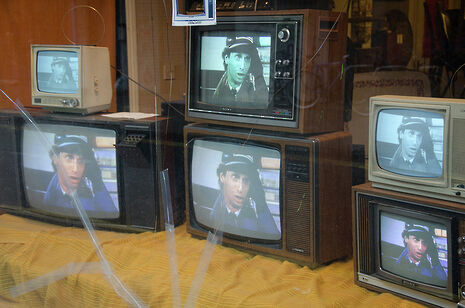A queerer perspective: TV out of the closet
Louis Shankar talks about LGBT+ representation on TV

I have been watching quite a few episodes of Friends lately. On the most recent re-run through the 10 seasons, I’ve picked up on a few things, many of which are problematic. Take the latent homophobia and heteronormativity that is pervasive in so many episodes. It gets tiring trying to count how many times Chandler’s sexuality is questioned as a punchline to a joke, or how any even slightly feminine action leads to Joey or Ross’s gender being joked about. Not to mention the lesbian wedding in the second season, which too was taken as the butt of many unoriginal jokes.
LGBT+ representation on television is disparate and often poor. Programmes that don’t have LGBT+ issues and characters at their core, such as my current favourite Grace and Frankie, can still rely on parody or reduction. On the other hand, Orange Is The New Black and Unbreakable Kimmy Schmidt both do a good job, as do the major UK soaps; Netflix still seems to be leading the way, significantly ahead of the major US networks. That said, Game of Thrones is an interesting example, with its expressly medieval attitudes providing an unfortunately resonant contemporary critique; Brooklyn Nine-Nine, meanwhile, has to have one of the most sensitive and understated gay characters in Captain Raymond Holt.
There are two characters from two shows I would like to focus on, who might initially seem like strange choices: Jeremy from Peep Show and Mac from It’s Always Sunny in Philadelphia. (Disclaimer: spoilers follow for both shows, particularly the most recent respective seasons.)
Jeremy, seemingly out of nowhere, starts an affair with a man, who is the boyfriend of a client with whom he also has an affair, and starts to question his sexuality. On the bus, he has a wonderful debate with himself: “Am I a guy who just slept with a guy, which is fine, or am I a guy who is a gay guy, which is also fine, or am I a guy who sometimes sleeps with guys and sometimes doesn't? Which is also fine. It's all totally fine!” I thought this simple storyline was fantastic: Jeremy’s sexuality was fluid, driven mostly by lust. He was experimenting without hesitation, did not jump to any conclusions, and instead embraced the fluidity of it all, (poorly) attempting a ‘threeism’ (a three-way relationship).
Mac, full name Ronald McDonald, played by It’s Always Sunny creator Robert “Rob” McElhenney, is rarely so sure of his sexuality. Obsessed for a brief time with older women, he then has a short relationship with a trans-woman. However, in the most recent season finale, he comes out as gay on a Christian cruise, only to then withdraw this when back on dry land. Jokes are repeatedly made about his sexuality: he makes excuses to go to a gay club alone or spend an afternoon oiling up bodybuilders. Albeit a slight caricature, he is the epitome of a closet case, refusing to accept himself as either bisexual or gay because of his religion. His friends and family have accepted this. Coming to terms with it himself – usually the most difficult part of coming out – is the next step.
The real genius of It’s Always Sunny is the simple fact that all of the central characters – the five members of ‘The Gang’ – are horrible people. They have faults but they are human: often somewhat relatable but never entirely. Charlie is perhaps the most naïve member of ‘The Gang’, Dennis by far the most psychotic and Frank (played by the wonderful Danny DeVito) the most nefarious. Dee, played by Kaitlin Olson, one of the best comic actresses on television, is an incredibly stalwart female character, mocked incessantly but forever holding her own. Now a cult classic, breaking records as it starts filming its twelfth season, with all episodes currently on Netflix, It’s Always Sunny is probably my favourite comedy, even over Peep Show. Its dark humour is unsurpassed in its depravity and excess, dialing everything up to 11 without warning.
I know of no other comedy that would have two characters sneak into a morgue with a hotplate to try and taste some human flesh, or quit their jobs to achieve their dreams only to end up on welfare and addicted to crack cocaine. The transphobia and homophobia that emerge from these ultimately horrible, egocentric people are representative of wider societal issues: Mac tries to ‘fight gay marriage’ and fails spectacularly, citing scripture that is quickly shot down. It’s Always Sunny is a hilarious but worrying portrait of modern America, its attitudes to LGBT+ issues included. Paddy’s Pub might not be an expected place to tackle grander societal problems but the character of Mac, confused and uncertain of his repressed sexuality, raises issues about LGBT+ questions rarely dealt with elsewhere on television.
 News / ‘Out of the Ordinary’ festival takes over Cambridge 26 August 2025
News / ‘Out of the Ordinary’ festival takes over Cambridge 26 August 2025 News / Government pulls £277M in funding for Cambridge sewage works relocation25 August 2025
News / Government pulls £277M in funding for Cambridge sewage works relocation25 August 2025 News / Tompkins Table 2025: Trinity widens gap on Christ’s19 August 2025
News / Tompkins Table 2025: Trinity widens gap on Christ’s19 August 2025 Comment / Who could possibly want more exams?25 August 2025
Comment / Who could possibly want more exams?25 August 2025 News / News in Brief: Brain breakthroughs, bouldering, and the ‘broligarchy’24 August 2025
News / News in Brief: Brain breakthroughs, bouldering, and the ‘broligarchy’24 August 2025








